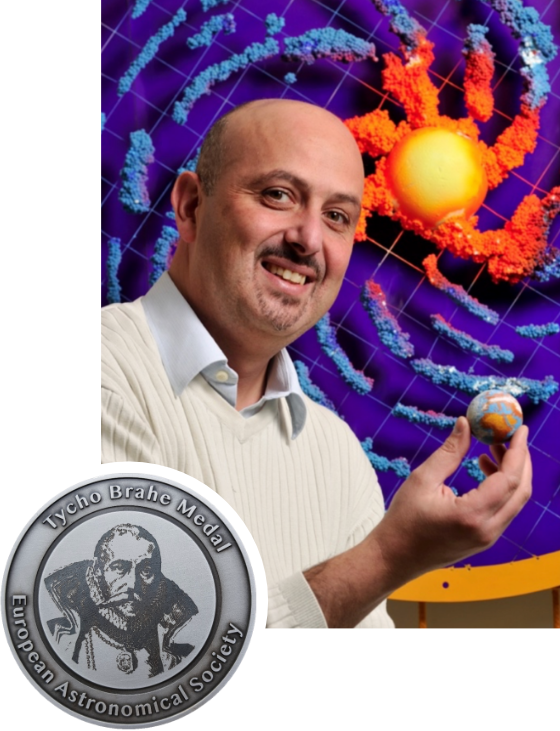Tycho Brahe Medal
The Tycho Brahe Medal is awarded each year by the European Astronomical Society (EAS) in recognition of the development or exploitation of European instruments or major discoveries based largely on such instruments. The 2024 Tycho Brahe Medal is awarded to Prof. Francesco Pepe (University of Geneva, Switzerland) for the development and exploitation of ultra-stable high-resolution spectrographs which revolutionised the detection and characterisation of small-mass exoplanets.
 |
Prof. Francesco Pepe obtained his diploma in physics and his PhD in astrophysics at the Swiss Institute of Technology (ETHZ), developing an infrared imaging spectrometer to fly under stratospheric balloons. He then moved to the department of astronomy of the University of Geneva where his skills and instrumental competences proved to be decisive for the development of the HARPS spectrograph for ESO, of the sister instrument HARPS-North on the Telescopio Nazionale Galileo (TNG) at La Palma, and of ESPRESSO on the VLT. Since 2018, Francesco Pepe has been full professor and director of the Department of Astronomy. His main research topics are the detection of small-mass exoplanets via the measurements of extreme precision radial velocities and the characterisation of planetary atmospheres via transmission spectroscopy at high resolution. |
The discovery by Michel Mayor and Didier Queloz in 1995 of the first giant planet outside our solar system, rewarded by the Nobel Prize in Physics 2019, spawned a revolution in astronomy in terms of understanding planet formation and evolution. There followed a rapid push to develop the observational capabilities needed to study them in more detail. Prof. Francesco Pepe has led the development of the next generation of ultra-stable spectrographs for extremely precise radial velocity measurements (1 m/s precision and below), including e.g. HARPS on the ESO 3.6m telescope, HARPS-North on the Telescopio Nazionale Galileo (TNG) on La Palma, and ESPRESSO on the ESO Very Large Telescope.
These instruments are central in the activities of astronomers studying exoplanets. HARPS observations led to the discovery of an unexpectedly large population of small planets, super-Earths and Neptune-like planets close to their stars, that are not found in our Solar System. To confirm and measure the mass of the planet candidates detected by the Kepler satellite, a copy of HARPS was developed and installed in the northern hemisphere on the TNG on La Palma by an international consortium led by Prof. Pepe. HARPS-North has been since then a key instrument for the study of the internal composition of small-mass planets. ESPRESSO on the VLT has made exquisite radial-velocity measurements of unrivalled precision (at 3σ level of 25 cm/s) which has enabled mass measurements for even lower- mass planets, reaching less than the mass of the Earth for planets on close-in orbits.
High-resolution, ultra-stable spectrographs developed for extreme precision radial velocity measurements have also proven to be perfect instruments for the analysis of the atmospheres of exoplanets via transit spectroscopy. The stability and spectral fidelity of the new generation of spectrographs is such that it has made possible the separation of the spectral information coming from the planet itself, e.g., through ground-based transmission spectroscopy, thus enabling the study of planetary atmospheres.
Through the development of ultra-stable high-resolution spectrographs, the contribution of Prof. Francesco Pepe to the field of exoplanets and to astrophysics in general has been outstanding.
March 5, 2024News
